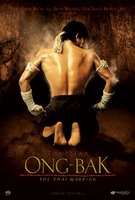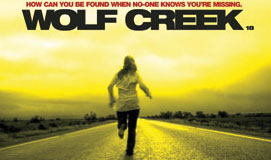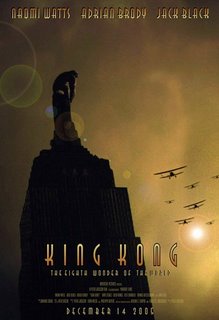
Still on “winter break” as it were with the studios having screened us to death in the couple of weeks leading up to Christmas and allowing us now to breathe a collective sigh before the avalanche of garbage too awful for release any other time of the year is dumped on us between now and sometime in the middle of March. There’s a reason that most professional critics I know take long vacations in the month of January.
For the middle states and outlying markets, however, this is the kick-off to a period of slow-releases for stuff like The New World (reportedly twenty-minutes shorter than the print screened for critics in December – and I don’t think that Malick is being pressured to make the trim), The Three Burials of Melquiades Estrada, Match Point, Caché, and so on. What’s really taken me by surprise this year is the sheer number of quality films that never had a hint of a screening in Colorado for any of the major critics (for me, neither) – films like Herzog’s The White Diamond and Weerasethakul’s Tropical Malady that are both now available on DVD and are both serious flicks that deserve serious looks.
Jonathan Rosenbaum wrote once about how it’s not entirely a matter of the popular audience having no taste so much as it’s all tied up with the truism that the popular audience often doesn’t have a choice. Go to the one cinema in a one-horse town and you get to watch the penguin movie or Whale Rider for eighteen months. Even Denver, a two-horse town, only has around twenty screens devoted to independent film and all twenty of them are programmed by Landmark which is, I think, based in Seattle nowadays besides having other interests besides growing an audience in mind. The thought that we’re often not even allowed to indulge in our better selves when it comes to films gains a scary kind of mileage.

It’s a brave new world: made braver by the release of Steven Soderbergh’s Bubble in a couple of weeks, simultaneously on Pay-Per-View, DVD, and theatrically. The Mark Cuban’s experiment – it makes you wonder if it’s an idea that presages a seismic event, or if it’s just a ripple on the pond.
Speaking of Tommy Lee Jones’ directorial debut (from a script by Guillermo Arriaga of 21 Grams, Amores Perros fame), Three Burials is essentially Crash 2: Cormac McCarthy with the weight of cosmic ironies in its tale of racial intolerance and good, ol’ fashioned Old Testament retributive justice, handily submarining the mood of the piece which is, all things considered, pretty good. The gem is The Band’s legendary drummer Levon Helm in a bit part as a blind guy Jones and the comic-book super-bigot played by Barry Pepper come across in their odyssey across the border. He’s freakin’ amazing in a film that boasts as its only other real innovation the discovery of a new Bridget Fonda: flawless, aquiline, largely inexpressive January Jones.
Best Supporting Actor of 2005? Levon Helm
and, while we’re at it, Best Supporting Actress – always a tough call – I’m going with either Robin Wright Penn for Nine Lives, Amy Adams for Junebug, or Maria Bello for A History of Violence.
 Best Actress would be Dina Korzun for Forty Shades of Blue: a genuinely affecting and unsettling performance that, in moments, demonstrates the physical manifestation of emotions in ways courageous and jaw-dropping. I loved Jennifer Connelly in the badly underestimated Dark Water, too, and Ms. Kilcher’s turn in The New World as the eternally un-named Pocahontas.
Best Actress would be Dina Korzun for Forty Shades of Blue: a genuinely affecting and unsettling performance that, in moments, demonstrates the physical manifestation of emotions in ways courageous and jaw-dropping. I loved Jennifer Connelly in the badly underestimated Dark Water, too, and Ms. Kilcher’s turn in The New World as the eternally un-named Pocahontas.Charges of racism in The New World and King Kong, by the way, are largely kneejerk and off base in my mind: but they’ve inspired a flurry of white, middle-class critics across the country to finally take up the flag (including in my own backyard! especially odd because he’s not the paper’s critic, and the paper’s critic, curiously mum, is an African-American woman) when these same crix have been conspicuously silent for the most part on genuinely, maybe even willfully, appalling pictures (racist, misogynistic, badly done, the whole nine yards) like Hustle & Flow.
Best Actor? Let’s give it to Damian Lewis in a runaway race for Keane. The unlikelihood that he’ll even be mentioned come awards time should only magnify his esteem.
Best Gay Cowboy Movie: Brokeback Mountain
Best Gay Musical: Rent
Best Breakthrough Gay Movie: Tropical Malady
Caché, by the way, lives up to the hype. A film touted as without an ending that actually has an ending – and one of the most fascinating looks at the process, and innate aggression, of viewership since Peeping Tom. It’s a metaphysical horror film – a picture a lot like A History of Violence but without the soothing tones of a familiar infra-structure. Doesn’t make it necessarily better or worse, but it does make its audience smaller. I’m a huge fan of Haneke’s Code Unknown, The Piano Player, and the apocalyptic sci-fi’er Time of the Wolf - and Caché, scavenging the most elements from his legendary mindfuck Funny Games, represents something of a second-tier work by the Austrian. Which is, of course, pretty spectacular in any time.
The Best Munich: Batman Begins which, with one line about the escalation of freakism (Joker sighting) following
 Batman’s reign of righteous vengeance (spreading terror and destruction throughout the city he seeks to protect from terror), says with eloquence what Munich says for 165 minutes to steadily diminishing-returns. Give Spielberg credit at least that the supporting Jews in his film didn’t all slot themselves into the polite, well-behaved Jew stereotypes of Schindler’s rescued Jews (affecting only en masse said J. Hoberman, once upon a time) – though the one I remember most is the lovable Mossad accountant who gets the film’s biggest laughs demanding “Receipts! Receipts! Receipts!”. Hilarious, am I right?
Batman’s reign of righteous vengeance (spreading terror and destruction throughout the city he seeks to protect from terror), says with eloquence what Munich says for 165 minutes to steadily diminishing-returns. Give Spielberg credit at least that the supporting Jews in his film didn’t all slot themselves into the polite, well-behaved Jew stereotypes of Schindler’s rescued Jews (affecting only en masse said J. Hoberman, once upon a time) – though the one I remember most is the lovable Mossad accountant who gets the film’s biggest laughs demanding “Receipts! Receipts! Receipts!”. Hilarious, am I right?I won’t pretend that my affection for gravid comic book movies doesn’t have something to do with the fantasy of dressing up in rubber and smiting evil-doers whilst gaining the doe-eyed attentions of hot, but sexually un-threatening women – but like a good fairytale, I think a good comic book premise allows for maturation, meat, and escalation if one were so inclined. Whether one should be so inclined is another matter, I guess, but I for one would love to see the proposed $100m HBO
 miniseries adaptation of Alan Moore’s astonishing The Watchmen come to fruition.
miniseries adaptation of Alan Moore’s astonishing The Watchmen come to fruition. (this faux-teaser poster for a Batman Begins sequel is fan art from a German website, taking the visage of Conrad Veidt and photoshopping it to their Bavarian hearts’, and ours’, delight)
Two Random Thoughts and One Dire Prediction to Round Out 2005
The Dukes of Hazzard is exactly the same movie for dumb boys that Herbie: Fully Loaded was for dumb girls. Nearly identical, really, with the same soul-sucking emptiness, the same racing subplot and the same ear-blowing veneration of revving noises.
For the first time in ages, Sundance produced a couple of real gems: Junebug, Forty Shades of Blue, and The Squid and the Whale. It also produced the abovementioned Hustle & Flow and March of the Penguins which, incidentally, inspired some right-wing wackos to declare that these animals’ nightmarish journey was proof positive that theirs was a universe of intelligent design governed by a just and reasonable god. You could for a while download a checklist to take with you to the theater (flashlight in hand, of course) to mark all the places that God speaks to you through this stirring, Morgan Freeman-narrated testament. I like this article by Andrew Sullivan from London’s Sunday Times that talks a little about penguin monogamy, transgenderism, and homosexuality.
If I have one prediction for 2006, it’s that the success of this and Narnia 1 will inspire more directed marketing to groups like Focus on the Family which, and really folks I’m not going out on a limb saying this, is like making a film and crafting its marketing campaign explicitly for the enjoyment of the Taliban. Why don’t they make a movie about how the most visible/vocal factions of the Christian right are trafficking in fear-mongering, exclusion, ignorance, and hate? Oh wait - maybe they have.
Here’s screen capture #3.2, and the first of the New Year: 


 The White Diamond is exceptional – the kind of thing that you’d call a return to form for Herzog meaning that it’s good in a way that’s so predictable that it doesn’t feel bracing. That is, if you think that genius can ever be off the cuff. I’m comfortable saying that it’s nigh indispensable viewing, but even so, I felt like the wires were showing too often in this tale of a man obsessed about building a lightweight airship to explore the rainforest canopy in search of herbal remedies and undiscovered species of both flora and fauna. Seems a colleague of his had died ten years previous in a similar experimental flight (something he retells in a haunting passage), lending the quest that air of Herzogian mania – and along the way, our favorite Bavarian madman finds a couple of supporting characters (especially a dude named Marc Antony Yahp who could be the most relaxed man on the planet) that delight with their eccentricity. When the lights go out, though, it’s Herzog eternally as the craziest guy in the film which makes his work at odds with Errol Morris in that one crucial element. Herzog is the inmate, Morris the asylum. I’m glad I saw it – I still like
The White Diamond is exceptional – the kind of thing that you’d call a return to form for Herzog meaning that it’s good in a way that’s so predictable that it doesn’t feel bracing. That is, if you think that genius can ever be off the cuff. I’m comfortable saying that it’s nigh indispensable viewing, but even so, I felt like the wires were showing too often in this tale of a man obsessed about building a lightweight airship to explore the rainforest canopy in search of herbal remedies and undiscovered species of both flora and fauna. Seems a colleague of his had died ten years previous in a similar experimental flight (something he retells in a haunting passage), lending the quest that air of Herzogian mania – and along the way, our favorite Bavarian madman finds a couple of supporting characters (especially a dude named Marc Antony Yahp who could be the most relaxed man on the planet) that delight with their eccentricity. When the lights go out, though, it’s Herzog eternally as the craziest guy in the film which makes his work at odds with Errol Morris in that one crucial element. Herzog is the inmate, Morris the asylum. I’m glad I saw it – I still like  Spider Forest is an a-linear genre exercise that sort of reminds of Jacob’s Ladder and
Spider Forest is an a-linear genre exercise that sort of reminds of Jacob’s Ladder and 

 In a just world, it would win the two supporting actor Oscars – if it were a film by itself, it would be one of my top films of the year. The other great segment is the first one, involving a middle-aged woman in prison, dealing with a visit from her young daughter. But, alas, there’s a lot of dross in here.
In a just world, it would win the two supporting actor Oscars – if it were a film by itself, it would be one of my top films of the year. The other great segment is the first one, involving a middle-aged woman in prison, dealing with a visit from her young daughter. But, alas, there’s a lot of dross in here.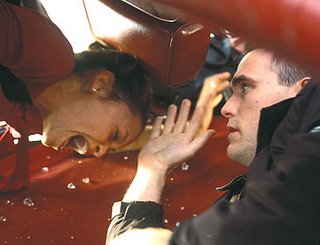 But more on that ideological schism: I question, seriously, if these picks reflect the ten films that Ebert thought were the best of the year or the ten that he thought were the best for him, politically, popularly, to choose. More troubling, maybe his top ten are films that he believes you need – which would be fine except that he so underestimates “us” that it’s insulting. The write-up on
But more on that ideological schism: I question, seriously, if these picks reflect the ten films that Ebert thought were the best of the year or the ten that he thought were the best for him, politically, popularly, to choose. More troubling, maybe his top ten are films that he believes you need – which would be fine except that he so underestimates “us” that it’s insulting. The write-up on 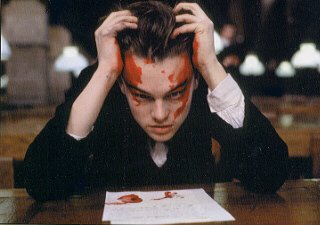 Just like
Just like 
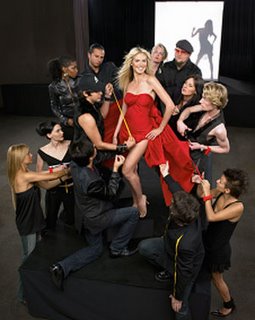 Also watched the first season of “Project Runway” in one compulsive sitting: it’s the first reality show since the first season of “The Apprentice” that I actually enjoyed without a lot of guilt and, when all’s said and done, I think it’s better. It’s a show about product, and sweat, and inspiration instead of twelve monkeys in a glass cage with one banana. I believed it was about a functioning meritocracy – maybe I was duped – I’m going to assume that I wasn’t.
Also watched the first season of “Project Runway” in one compulsive sitting: it’s the first reality show since the first season of “The Apprentice” that I actually enjoyed without a lot of guilt and, when all’s said and done, I think it’s better. It’s a show about product, and sweat, and inspiration instead of twelve monkeys in a glass cage with one banana. I believed it was about a functioning meritocracy – maybe I was duped – I’m going to assume that I wasn’t.

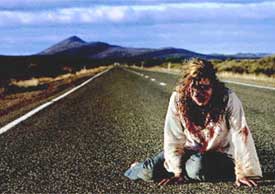
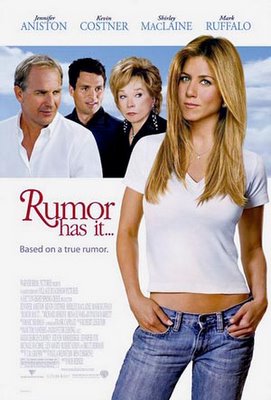







 Most of the criticism of this film has been along the lines of it doesn’t have a heart – bologna – there’s a dead kid, a broken marriage, a reconciliation, an absentee father and an emotionally-vacant son, and on and on, woven in and out of all the broadsides at macroeconomics and the very fundamental non-secrets of how the world works when no one thinks that you’re watching. It’s got plenty of heart, it just doesn’t have any surprises.
Most of the criticism of this film has been along the lines of it doesn’t have a heart – bologna – there’s a dead kid, a broken marriage, a reconciliation, an absentee father and an emotionally-vacant son, and on and on, woven in and out of all the broadsides at macroeconomics and the very fundamental non-secrets of how the world works when no one thinks that you’re watching. It’s got plenty of heart, it just doesn’t have any surprises.
